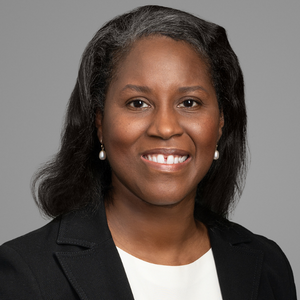Katherine Stoller: Partner, Litigation, Shearman & Sterling
 “You have to be able to step back and think about not only the problem in front of you right now, but what are the next several months of this case going to look like?” reflects Katherine Stoller. “Where are the risks that we’re not focused on today, but we need to be able to see coming at us from other directions?”
“You have to be able to step back and think about not only the problem in front of you right now, but what are the next several months of this case going to look like?” reflects Katherine Stoller. “Where are the risks that we’re not focused on today, but we need to be able to see coming at us from other directions?”
Stoller speaks to how listening matters, the importance of presence and anticipation, and bringing the hard-to-navigate topics into the office chat.
Growing Through High Intensity
Working in the litigation practice, Stoller represents clients in criminal and regulatory investigations – representing people and companies involved in government investigations that can involve allegations of money laundering, sanctions violations, securities fraud, insider trading and market manipulation. She also represents clients in civil litigation, advises financial institutions on their ongoing relationships with regulators and conducts internal investigations.
“By the time clients bring in an enforcement lawyer, they’re frequently in high-stakes situations with a potential crisis on the horizon, so you come in as the steady hand and repeat player. You have to be a good listener,” says Stoller. “The first job is always to understand the facts and figure out the strategy , and then be ready to adjust the strategy as you go. It’s fascinating working with clients through these high intensity stretches.”
Not only is Stoller energized by the caliber of clients she works with on both the legal and business side, but she finds the cross-border aspect of her practice means that she is constantly learning – be it political, legal or cultural differences among the various international jurisdictions.
“Every case involves a different geography and a different business. You have to get steeped in the facts and the relationships among the clients and the regulators or enforcement agencies,” says Stoller. “You learn so much about how other countries operate, and I love that.”
Holding Grace Under Fire
Stoller finds good listening is a prerequisite of being an effective lawyer.
“I think a lot of lawyers come in and think it’s their job to start speaking right away. But there’s so much listening you need to do to understand the business, what the authorities are looking at and what matters to each of the stakeholders,” she says. “Taking all that information and building it into a strategy, and making sure you’re not missing out on what’s important to each of the stakeholders, is a really important skill.”
Stoller feels that understanding “the importance of narrative” is also very important, the ability to shape the story in a way that people can not only understand it, but follow the facts that are crucial to your argument.
As the daughter of an M&A partner at Skadden, she remembers hearing her father on the phone and even as a girl, she picked up that he modeled being a trusted advisor: “He was always calm and precise. You could count on his judgment. There’s a presence to being the calmest person in the room when things become challenging and intense. I hope I picked some of that up from listening to him.”
Moving More Towards Vision and Anticipation
Stoller joined Shearman & Sterling in January 2020, recognizing the opportunity to thrive with the firm, and made partner on July 1st of this year.
As a junior lawyer in the investigations space, doing well was about being meticulous, understanding the record well and not losing track of the details. But as she’s grown more senior as a lawyer, Stoller notes the remit has moved much more to big picture strategy and anticipation.
“The more senior you get, the more you are responsible for steering and being able to see around the corner and anticipating the different challenges that you’ll face along the way,” she observes. “You get more experienced at identifying the problems you may be seeing tomorrow.”
Stoller also values being able to effectively mediate conversations through difficult or stuck places so they can move forward, and without having to be a “bang-on-the-table sort of lawyer”.
Learning from Witnessing, Including Yourself
Having joined Shearman just a few weeks before the lockdowns, with few days in the office, Stoller looks forward to again experiencing in-office time with colleagues.
She notes that for her, much of her most valuable mentorship has happened through witnessing other lawyers in action when it counts: “I’ve learned a lot from sitting in people’s offices on the days when things are going wrong, when you get bad news and you respond to it, and one call leads to another. The chance to watch how excellent senior lawyers practice is important for more junior lawyers.”
Stoller emphasizes to those whom she mentors that it’s up to them to think about where they want to go, what they are good at and what they still need to learn.
“I think young lawyers need to feel empowered to ask for the kind of work they want and to speak up in meetings. There’s a strong tendency to stay quiet, which is the flip side of how important it is to learn from listening,” notes Stoller. “I encourage my junior associates to jump in, tell me if I missed something, ask a question, make the point someone else didn’t make, and start getting used to the sound of your own voice and advice. Of course, you also need to back that up by being diligent and having command of the facts and details.”
Bridging the Conversations
Stoller believes certain conversations should happen more often around law offices, so she will often bring up the topics that more junior lawyers may be reticent about.
“There are conversations that are hard to have and times where you don’t know if it’s okay to ask for something,” says Stoller. “I try to open the door to conversations I wanted to have when I was starting out. It can be a matter of just saying to someone, how are you doing? What kind of support do you need?”
Taking care of very little ones while managing a career that values long hours and lots of face time is one topic example, and a challenge she navigated some years back: “It’s hard to talk about the reality of your career during those few years when you need to leave the office at a certain point, or you don’t know when you’re going to be able to get the baby to sleep.” She feels it needs to be spoken to more explicitly, so parents can be open about what’s going on.
With a son of nine and a daughter of six and a passion for reading herself, Stoller makes sure to read to her kids every night and is currently in middle of a Laura Ingalls Wilder book, quite the throwback to her own childhood.
By: Aimee Hansen










